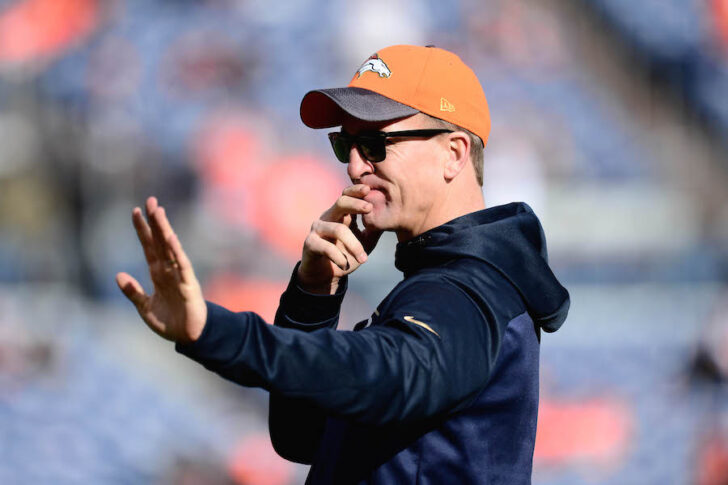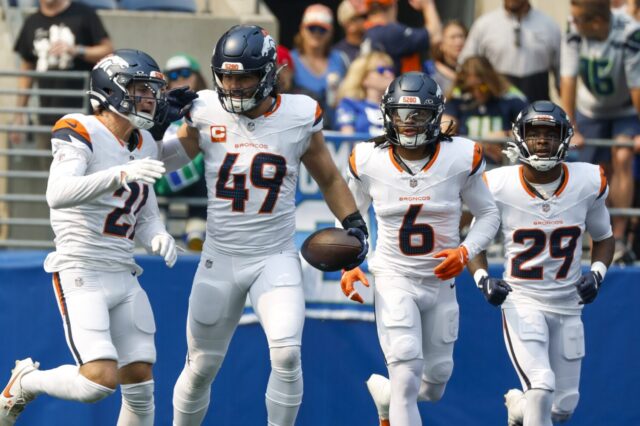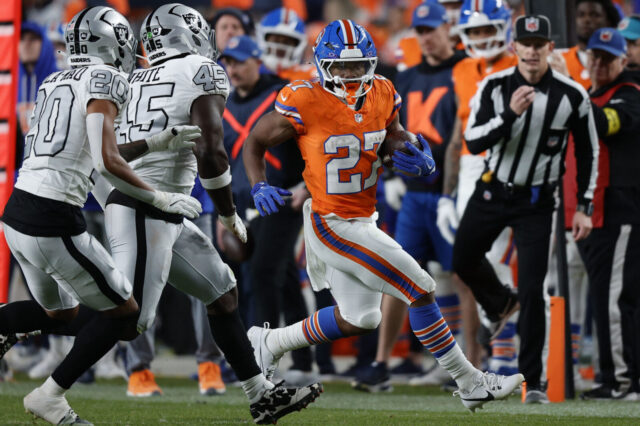On Saturday evening, the buzz started; within an hour or so, Twitter and other social media outlets were on fire with the breaking “news” that Peyton Manning had been accused of taking human growth hormone (HGH) in a documentary that was to air Sunday on Al Jazeera America.
Almost immediately, the hot takes began flying in from every corner.
Some opinions were expected, as Manning bashers were quick to make jokes about the quarterback not taking a high enough dosage during an injury-riddled 2015 season. The story was low-hanging fruit for those who take pleasure in seeing an all-time great’s legacy take a hit.
Others were a little more surprising, however, as columnists and media members jumped all over the future Hall of Fame quarterback without knowing much about the story. The fact that Manning hired someone to help him navigate this situation was all they needed to know in order to determine that he had something to hide.
It was a pretty embarrassing display all around, providing the latest example of today’s jump-to-a-conclusion mindset. Very few people took the time to watch the documentary, read the statements from the Broncos and Colts, and listen to Manning’s defense before making a judgment; it was much easier to simply chime in from afar, hoping to make a splash with the wittiest or snarkiest comment.
For those who did bother to look at all of the information, though, there was only one reaction that made much sense: Why is this a story?
On multiple fronts, the “bombshell” that aired last night on The Dark Side: The Secret World of Sports Doping was much ado about nothing. In fact, the only thing interesting about the story was that it involved a) one of the biggest stars in American sports and b) one of the hottest topic in athletics today. But those who looked beyond the fact that the headlines included both “Peyton Manning” and “performance-enhancing drugs” saw a total non-story.
First of all, the reporting is beyond flimsy; in fact, that’s an insult to the delicate, fragile and insubstantial things that are typically described that way. The entire accusation was based on one source, as Charles Sly was captured on hidden camera stating that The Guyer Institute, a clinic in Indianapolis, had shipped HGH to Ashley Manning in 2011. But he quickly turned into an unreliable informant.
For starters, Sly immediately recanted his comments, stating that he spoke out of turn to Liam Collins, the 37-year-old hurdler turned undercover “reporter” who recorded his comments. That’s pretty damning, given that the only witness to the case was changing his story before it was ever presented.
Beyond that, it was further discovered that Sly didn’t even work at the Guyer Institute in 2011. And when he was at the clinic in 2013, it was for a three-month stint as an intern. In other words, he wasn’t there to actually witness what he claimed; instead, everyone is supposed to believe that a deep, dark secret was told to the lowest person on the totem pole roughly 24 months after it allegedly happened.
For almost everyone, those question marks would’ve been enough to squelch the story. To every competent professional, it should take more than a two-year old rumor being told to an intern in order to drag someone with a previously pristine reputation through the mud.
But for some, that wasn’t reason enough to let the story go; they were still hell bent on tarnishing Manning’s reputation, eager to turn any mole hill into a mountain. So they clung onto the allegation that he had somehow “cheated” during his recovery from four neck surgeries, taking banned substances that should put a giant asterisk next to anything the quarterback accomplished post-2011.
Of course, that fails to ask one simple question: Even if Manning did take HGH, did he actually break the rules in doing so?
Prior to the collective bargaining agreement that the NFL and the players’ union signed in 2011, the league didn’t test for human growth hormone. The deal that made HGH something that the NFL was going to worry about wasn’t signed until July 25, just before teams reported for training camp. So unless Sly and/or Al Jazeera America can prove that Manning took HGH after that date, it’s a moot point; if he took it before it was on the league’s radar, it’s not a rule he was trying to skirt around.
But that doesn’t seem to matter to the anti-Manning crowd. They’re circling Dove Valley with pitchforks, hoping that the league and/or the court of public opinion will retroactively enforce rules that exist today but weren’t in place at the time of the alleged infraction. It’s the equivalent of wanting to give someone a speeding ticket for driving 55 miles per hour in 2011 because that stretch of road was reduced to a 45 MPH zone a few months later; the logic makes absolutely no sense.
All of which dovetails into the final point in this case: At the time Manning is accused of taking HGH, he wasn’t even an NFL player.
During the offseason in which Manning was trying to recover from his surgeries, a labor dispute prevented everyone on an NFL roster from being under contract; thus, no one was subject to the league’s rules, as every player was free to do whatever they wanted to at the time. And even if someone wanted to argue that the players should abide by their contract under some sort of honor system, that wouldn’t apply to Manning, either; he became a free agent at the end of the 2010 season and didn’t sign a new contract with the Colts until July 31, 2011, after the new CBA was ratified.
Even after that time, however, it can be argued that Manning still wasn’t truly an active player. During the 2011 season, he never participated in a training camp practice, preseason game or regular-season contest; in essence, he sat out the entire year while trying to recover from four surgeries that left him wondering about much more than his playing career.
At one point during Manning’s rehab, he couldn’t throw a football five yards. That’s how incapacitated one of the greatest quarterbacks in NFL history was by the injuries he had incurred during his 14 seasons in Indianapolis. As a result, it’s safe to assume that No. 18 was worried about much more during his recovery than being able to step onto the field again; his concerns extended into his quality of life, something of paramount importance to a man in his mid-30s with two infant children.
Given that situation, it’s hard not imagine Manning trying anything and everything in an effort to regain the use of his arm, feeling in his fingertips, etc. He had to be a little bit like Roy McAvoy scrambling to fix his case of the yips in Tin Cup; no possible cure would be too hair-brained to consider.
During that time period, it’d be hard for any right-thinking person to begrudge Manning for seeking out every option. He wasn’t just trying to gain any kind of competitive edge, which is what other PED users have done; if he took them, he simply was attempting to ensure that the game didn’t leave him permanently impaired. In that kind of a situation, most people would be scrambling for possible solutions; being a great athlete would only intensify the feelings of desperation.
It all adds up to a very weak case against one of the NFL’s all-time great players. As a result, the breaking news should have been greeted with warning sirens instead of trumpets; people should have looked into the story rather than simply taking it and running with it.
There’s still no evidence that Manning actually took HGH. In fact, more signs point to them being a part of fertility treatments for his wife than anything else.
There’s still no timeline that suggests Manning took HGH after the league started testing for it. At this point, there’s a seven-in-12 chance that if it occurred at all it would have been prior to the NFL’s latest CBA was signed in 2011.
And there’s still no definitive case to be made that Manning was anything more than a common citizen when he allegedly took HGH. It’s a drug taken by thousands of people as a treatment for all sort of ailments.
Two of these three problems could be solved through better vetting of the story; that’s on Al Jazeera, as the typically reputable news organization seems to have whiffed on this one. And if even applicable, the third issue would be subject to debate, personal opinion and further discussion; at the very least, it would be a divisive topic.
So until it’s proven that Manning a) took HGH, b) took it after the NFL started testing for it, and c) took it after returning as an active player in the league, the “story” isn’t fit for print. Prior to that, it’s nothing more than a weak attempt to besmirch someone’s reputation based on rumors, innuendo and extremely circumstantial “evidence.”
Anyone who believes in fairness and due process, no matter what team they root for or where their allegiance falls on the Broncos current quarterback debate, should agree with that stance. No one should be roasted without proper evidence.
Not Peyton Manning. Not John Q. Public. No one.



